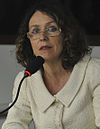Secretariat of Social Communication (Brazil)
| Portuguese: Secretaria de Comunicação Social | |
 | |
 | |
| Agency overview | |
|---|---|
| Formed | 7 June 1979 |
| Type | Ministry |
| Jurisdiction | Federal government of Brazil |
| Headquarters | Planalto Palace, Praça dos Três Poderes Brasília, Federal District |
| Agency executives |
|
| Website | www |
The Secretariat of Social Communication (Portuguese: Secretaria de Comunicação Social, Secom) is a cabinet-level federal ministry in Brazil. With a Ministry status, it is responsible for the release of funds and management of advertising contracts signed by the Federal Government.
With the ministry reform promoted by president Luiz Inácio Lula da Silva in 2007, the Secretariat incorporated the Secretariat of Press and Spokesperson, which is responsible for the relationship between the government and the media. This coincidence of attributions was criticized by external analysts.[1]
History
[edit]Between the end of the Gushiken administration and the 2007 ministry reform, Secom was an under-secretariat under the Secretariat-General of the Presidency. However, after the 2019 reform under the Bolsonaro administration, Secom became part of the Secretariat of Government.[2]
On 10 June 2020, the Special Secretariat of Social Communication of the Secretariat of Government of the Presidency was extinct by Provisional Measure 980/2020, having its attributions merged into the re-created Ministry of Communications.[3] The Secretariat was restored by the conversion of the Provisional Measure into Law 14074/2020.[4]
List of secretaries
[edit]| No. | Portrait | Secretary | Took office | Left office | Time in office | Party | President | |
|---|---|---|---|---|---|---|---|---|
| 1 | Said Farhat (1920–2014) | 7 June 1979 | 18 December 1980 | 1 year, 194 days | Independent | João Figueiredo (ARENA) | ||
| 2 | Sérgio Amaral (born 1944) | 1 January 1995 | 17 May 1999 | 4 years, 136 days | Independent | Fernando Henrique Cardoso (PSDB) | ||
| 3 | Andrea Matarazzo (born 1956) | 17 May 1999 | 10 December 2001 | 2 years, 207 days | PSDB | Fernando Henrique Cardoso (PSDB) | ||
| 4 | João Roberto Vieira da Costa (born 1963) | 10 December 2001 | 1 January 2003 | 23 years, 31 days | Independent | Fernando Henrique Cardoso (PSDB) | ||
| 5 | Luiz Gushiken (1950–2013) | 1 January 2003 | 22 July 2005 | 2 years, 202 days | PT | Luiz Inácio Lula da Silva (PT) | ||
| 6 | Luiz Tadeu Rigo (born 1957) | 1 August 2005 | 1 January 2007 | 1 year, 153 days | Independent | Luiz Inácio Lula da Silva (PT) | ||
| 7 | Helena Chagas (born 1961) | 1 January 2011 | 31 January 2014 | 3 years, 30 days | Independent | Dilma Rousseff (PT) | ||
| 8 | Thomas Traumann (born 1967) | 3 February 2014 | 25 March 2015 | 1 year, 50 days | Independent | Dilma Rousseff (PT) | ||
| 9 | Edinho Silva (born 1965) | 31 March 2015 | 12 May 2016 | 1 year, 42 days | PT | Dilma Rousseff (PT) | ||
| 10 | Márcio Freitas | 24 May 2016 | 1 January 2019 | 2 years, 222 days | Independent | Jair Bolsonaro (PSL) | ||
| 11 | Floriano Barbosa de Amorim Neto (born 1961) | 1 January 2019 | 9 April 2019 | 98 days | Independent | Jair Bolsonaro (PSL) | ||
| 12 | Fábio Wajngarten (born 1975) | 9 April 2019 | 11 March 2021 | 1 year, 336 days | Independent | Jair Bolsonaro (Ind) | ||
| 13 | André de Sousa Costa | 16 April 2021 | 1 January 2023 | 1 year, 260 days | Independent | Jair Bolsonaro (Ind) | ||
| 14 | Paulo Pimenta (born 1965) | 1 January 2023 | 15 May 2024 | 1 year, 135 days | PT | Luiz Inácio Lula da Silva (PT) | ||
| 15 | Laércio Portela Acting | 15 May 2024 | 10 September 2024 | 118 days | Independent | Luiz Inácio Lula da Silva (PT) | ||
| 16 | Paulo Pimenta (born 1965) | 10 September 2024 | 7 January 2025 | 119 days | PT | Luiz Inácio Lula da Silva (PT) | ||
| 17 | Sidônio Palmeira (born 1958) | 7 January 2025 | Incumbent | 3 days | PT | Luiz Inácio Lula da Silva (PT) | ||
Controversies
[edit]Writing to The Intercept Brasil, João Filho questioned the raise of public expenditure to RecordTV and other TV and radio broadcasters which owners were close to president Jair Bolsonaro. Prior to his administration, the public expenditure to broadcasters was spent according to their respective audience levels, but the method was cancelled with no reason.[5][6]
On 15 January 2020, it was revealed by Folha de S. Paulo that Fábio Wajngarten, head of the Secretariat, received through a company which he's a partner, money from TV broadcasters and advertisement agencies which has contracts signed with Bolsonaro administration. Among them are Rede Bandeirantes and RecordTV.[7] This fact was analyzed by Reporters Without Borders, which analyzed the attacks of Bolsonaro against the press.[8] In June 2020, an investigation published by Agência Pública confirmed that Evangelical broadcasters and pastors supporters of the government were the ones who most received public expenditures from the Secretariat, which were at least 30 million reais. The majority of the money was destined to RecordTV, the Universal Church of the Kingdom of God and the International Grace of God Church.[9]
In July 2020, another investigation by Agência Pública shows that the government, through the Secretariat, sponsored advertising in YouTube of the Social Security Reform in child content, Bolsonaro supporters, religious and fake news channels.[10]
In a complaint filled by the Federal Prosecutor Office of Citizen Rights, the former secretary, Fábio Wajngarten, was charged by the crimes of apology for crime and criminal in the Federal Justice of the Federal District due to tweets praising crimes committed by the Brazilian military during the Araguaia Guerrilla and to Major Sebastião Curió.[11][12][13]
See also
[edit]References
[edit]- ^ Guerreiro, Gabriela (29 March 2007). "Franklin Martins diz que relação de Lula com a imprensa será melhor". Folha de S. Paulo (in Brazilian Portuguese). Retrieved 16 June 2023.
- ^ "Novo secretário da Secom ataca imprensa e políticos em rede social". Blog da Cidadania (in Brazilian Portuguese). 13 December 2018. Retrieved 16 June 2023.
- ^ "Medida Provisória n° 980, de 10 de junho de 2020". Palácio do Planalto (in Brazilian Portuguese). 10 June 2020. Retrieved 16 June 2023.
- ^ "Lei n° 14.074, de 14 de outubro de 2020". Palácio do Planalto (in Brazilian Portuguese). 14 October 2020. Retrieved 16 June 2023.
- ^ João Filho (23 February 2020). "Bolsonaro se diz perseguido pela imprensa. Mas Band, SBT, Record e Rede TV estão ao seu lado". The Intercept Brasil (in Brazilian Portuguese). Retrieved 16 June 2023.
- ^ Prazeres, Leandro (15 April 2019). "Gasto do governo federal com publicidade cresce e Record supera Globo". Folha de S. Paulo (in Brazilian Portuguese). Retrieved 16 June 2023.
- ^ "Chefe da Secom recebe dinheiro de emissoras contratadas pelo governo Bolsonaro". Último Segundo (in Brazilian Portuguese). 15 January 2020. Retrieved 16 June 2023.
- ^ "Como o presidente Bolsonaro tenta, metodicamente, silenciar a imprensa crítica". Repórteres Sem Fronteiras (in Brazilian Portuguese). 16 April 2020. Retrieved 16 June 2023.
- ^ Fonseca, Bruno; Correia, Mariama (15 June 2020). "Governo gastou mais de R$ 30 milhões em rádios e TVs de pastores que apoiam Bolsonaro". Agência Pública (in Brazilian Portuguese). Retrieved 16 June 2023.
- ^ Maciel, Alice; Fonseca, Bruno; Rudnitzki, Ethel; Scofield, Laura; Correia, Mariama (7 July 2020). "Governo patrocinou propaganda da Previdência para canais infantis, religiosos e investigados pela Justiça". Agência Pública (in Brazilian Portuguese). Retrieved 16 June 2023.
- ^ Veleda, Raphael (19 May 2020). "AGU: sociedade deve conviver com "interpretações alternativas" da ditadura". Metrópoles (in Brazilian Portuguese). Retrieved 16 June 2023.
- ^ Schuquel, Thayná (6 May 2020). "MPF pede inquérito contra Wajngarten por post sobre Guerrilha do Araguaia". Metrópoles (in Brazilian Portuguese). Retrieved 16 June 2023.
- ^ "Diante de apologia a crimes contra a humanidade, PFDC pede responsabilização de chefe da Comunicação do governo". Ministério Público Federal (in Brazilian Portuguese). 6 May 2020. Retrieved 16 June 2023.
External links
[edit]- Official website (in Portuguese)










